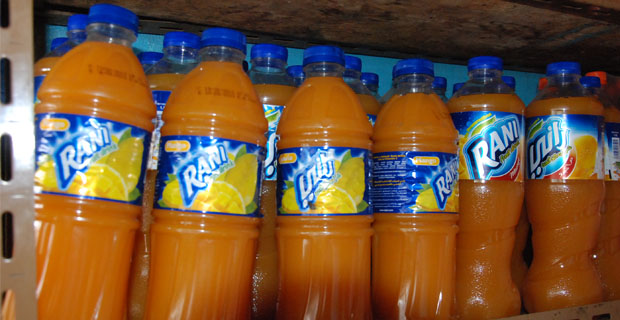
Fortune News | Apr 06,2019
Mar 2 , 2019
By BERHANE HAILEMARIAM ( FORTUNE STAFF WRITER )
 The Federal Food & Drug Authority disposed of Rani juice products valued at 8.4 million Br from warehouses of Amard Industries Plc, one of its distributors.
The Federal Food & Drug Authority disposed of Rani juice products valued at 8.4 million Br from warehouses of Amard Industries Plc, one of its distributors. The Federal Food & Drug Authority disposed of Rani juice products valued at 8.4 million Br from warehouses of Amard Industries Plc, one of its distributors.
The Authority disposed of 98pc of 333,760 canned and bottled juices that were found to be spoiled, according to Amard.
The products included different sizes of mango, apple and peach juices packed in cans and plastic bottles. The Authority disposed of the items in the presence of representatives from the ministries of Revenues and Health on February 22, 2019 at Qality Disposal Site. The remaining 7,760 products will be disposed of in the next week.
Amard made the request for disposal last November. However, the company did not receive a certificate of clearance from the Authority to confirm the figure or approve the disposal of the product.
“The Authority will reveal the exact quantity of the disposed of material and the issuance of a certificate in due course,” says Samson Abraham, head of public relations at the Authority.
The Drug Authority has previously destroyed 19,390 cartons and 240 pieces of Rani products between August 2017 and October 2018, valued at 8.1 million Br at the request of Amrad. The Rani products are manufactured in Saudi Arabia and Dubai.
“This is the fifth time we have identified and informed the authorities of spoiled products,” said Abdulmalik Bilal, CEO of the 14-year-old Amard, which engages in agricultural investment, import and export, as well as the distribution of products.
Amard orders five types of Rani products that are at least six months away from reaching their expiration date at the time of import.
The Authority banned all Rani one-litre juice products on July 30, 2018, after the products changed colours between sixth to nine months after production.
Amard, which has 140 employees, has sued Aujan Beverage Company, the manufacturer of Rani juices in Saudi Arabia, Dubai and Egypt, for compensation of more than 42 million Br incurred as a result of defamation by one of its employees.
In addition, the company demanded 4.3 million Br monthly compensation for lost profits over the last eight months, a 585,100 Br fixed payment for 40 idle personnel and a compensation fee of 780,733 Br for employees whose contracts were terminated.
Both the defendant and plaintiff appeared at the first session held a month ago at the Federal High Court. The judges adjourned the case to April 1, 2019.
Similarly, the company has also requested compensation for the office and warehouse rents that cost 417,391 Br and uncollected rental fees from 108 refrigerators used by retailers during sales of the products.
Aynadis Tamene (PhD), lecturer and microbiologist at Addis Abeba University's School of Food Science & Nutrition, who prviously been a member of a committee established to solve a dispute on a specific batch of Rani juice, affirms that colour and flavour changes in any food products are considered to be quality factors.
“These are possibly caused by exposure to high temperatures during transportation and storage,” said Aynadis.
“Consignment tests made on every product at the manufacturing and destination countries are essential.”
Note: This story is edited after we learned that we have made couple of errors in the original story.
PUBLISHED ON
Mar 02,2019 [ VOL
19 , NO
983]

Fortune News | Apr 06,2019

Viewpoints | May 31,2020

Fortune News | Feb 04,2023

Radar |

Fortune News | Apr 16,2022

Fortune News | Oct 21,2024

Fortune News | Apr 27,2025

Fortune News | Jul 21,2024

Radar | Feb 22,2020

Radar | Oct 14,2023

Dec 22 , 2024 . By TIZITA SHEWAFERAW
Charged with transforming colossal state-owned enterprises into modern and competitiv...

Aug 18 , 2024 . By AKSAH ITALO
Although predictable Yonas Zerihun's job in the ride-hailing service is not immune to...

Jul 28 , 2024 . By TIZITA SHEWAFERAW
Unhabitual, perhaps too many, Samuel Gebreyohannes, 38, used to occasionally enjoy a couple of beers at breakfast. However, he recently swit...

Jul 13 , 2024 . By AKSAH ITALO
Investors who rely on tractors, trucks, and field vehicles for commuting, transporting commodities, and f...

Nov 1 , 2025
The National Bank of Ethiopia (NBE) issued a statement two weeks ago that appeared to...

Oct 25 , 2025
The regulatory machinery is on overdrive. In only two years, no fewer than 35 new pro...

Oct 18 , 2025
The political establishment, notably the ruling party and its top brass, has become p...

Oct 11 , 2025
Ladislas Farago, a roving Associated Press (AP) correspondent, arrived in Ethiopia in...